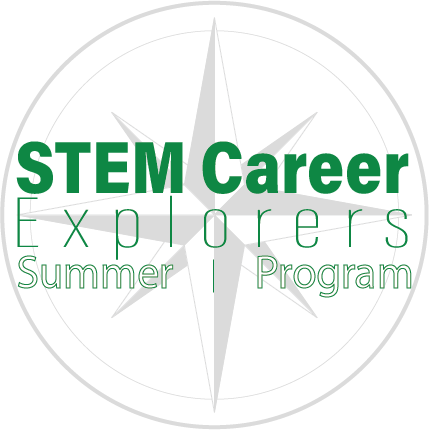Students will need an interest in exploring the STEM fields. The ability to understand basic concepts and follow instructions is needed. The program will be designed for students with little to no previous exposure to these STEM topics and lessons start with basic concepts. Each day will focus on a different STEM topic and students will participate in hands on interactive projects with guided instruction.
STEM! Summer Programs
This multi-day, non-residential, summer program will feature the following STEM subjects:
| Civil Engineering | Aerospace Engineering/Rocketry |
| Electrical Engineering | Veterinary Medicine |
| Geology | Computer Science |
| Paleontology | Robotics |
| Meteorology |
Students will participate in the following hands on activities:
Civil Engineering
- Building bridges (create weight bearing bridges using K'NEX and lightweight wood)
Electrical Engineering
- Paper Circuits (Create simple circuits with LEDs on paper crafts)
- Classic Game Circuit Board Soldering Project (Solder a simple circuit board that plays a classic arcade game)
Geology
- Mineral Testing (Collect local minerals & test classic traits of rocks alongside provided specimens)
- Geodes & Gem Identification (Break open geodes & compare to provided gems for testing & identification)
- Soil Testing (Collect local soil samples and test for minerals and pH, Compare to sediments for soil quality)
Paleontology
- Excavating Fossils (Set up a mock dig site using proper techniques and then dig for pre-placed fossils)
- Fossil Identification (Learn how to identify, categorize, and connect fossil specimens)
- Making Imprint Fossils (Use modern materials to create an imprint of a fossil)
Meteorology
- Building Weather Data Instruments (Build working models of multiple weather data collection instruments such as barometers, thermometers, etc.)
- Exploring Weather Phenomena (Use tools to explore solar heat, air pressure, etc.)
- Testing Green Screens (Learn the technology behind green screens for meteorologists on television)
- The Sun & UV Safety (Complete a UV light lab and create a UV sensitive wearable)
Aerospace Engineering/Rocketry
- Stomp Rockets (Model aeronautics principles with paper rockets launched using air)
- Model Rockets (Build classic solid engine model rockets to launch)
Veterinary Medicine
- Animal Anatomy Dissection Lab (Dissect cow eyeballs and pig heart)
- How to Draw Blood (Practice drawing blood using model animal legs & veins)
- Types of Animal Medicine (Learn differences between caring for large animals, small animals, exotics, and pets)
- Reading Microscope Slides (Use microscopes to examine blood samples from animals)
Computer Science
- Coding with Processing (Learn to use the program Processing to create simple art)
- Coding with Arduino (Code an Arduino board to blink LEDs)
Working with Microcontrollers (Code an Arduino board to move a servo motor)
Robotics
- Motorizing Linkages (Create cardboard linked creations that move with a coded motor)
- Robots or Kinetic Sculptures (Student choice to build a simple cardboard robot or a more artistic kinetic sculpture)
Session Dates
- TBD
STEM Career Explorers Flyers
